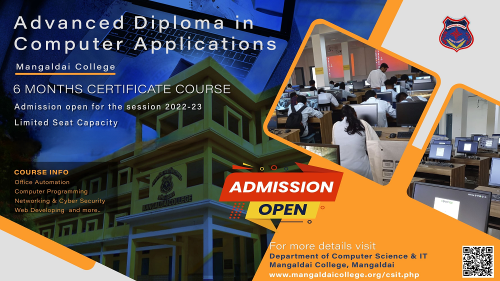About
Advanced Certificate Course in Computer Applications (ADCA)-Addon/Certificate Course
Designed by :Computer Science and IT Commencement Year : 2022-23 Intake Capacity : 60 Course Duration : 6 months Fees : 3100.00 Document uploaded by: Computer Science and IT Department
The Advance Certificate Course in Computer Applications (ADCA)
The Advance Certificate Course in Computer Applications (ADCA) is an extensive program aimed at equipping students with the necessary expertise and abilities to excel in computer hardware, software, networking, and web development. This program offers a solid grounding in the fundamental principles of computer science, enabling students to acquire the necessary skills for a career in the IT industry. Additionally, the program includes specialized courses covering topics like artificial intelligence, computer graphics, database systems, and multimedia.
Course Duration
The duration of this course is 6 months which basically includes topics like C programming, networking, ICT hardware, database management, office automation, etc...
Outcomes
C Programming
- Ability to write efficient and structured programs in the C programming language.
- Understanding of fundamental programming concepts such as variables, data types, control structures, functions, and pointers.
- Proficiency in algorithm development and problem-solving.
- Capability to build software applications and systems using C.
- Knowledge of low-level programming and memory management.
Networking
- Understanding of network protocols, architecture, and components.
- Ability to design, implement, and troubleshoot computer networks.
- Knowledge of IP addressing, subnetting, routing, and switching.
- Proficiency in configuring and managing network devices such as routers, switches, and firewalls.
- Skills to diagnose and resolve network connectivity issues.
ICT Hardware
- Knowledge of computer hardware components, including CPUs, memory, storage devices, and peripherals.
- Understanding of computer assembly, troubleshooting, and maintenance.
- Proficiency in installing and upgrading hardware components.
- Capability to diagnose and resolve hardware-related problems.
- Familiarity with hardware specifications and compatibility considerations.
Database Management
- Understanding of relational database concepts and principles.
- Ability to design and create relational databases using SQL.
- Knowledge of database normalization, indexing, and query optimization.
- Proficiency in managing and maintaining databases, including backup and recovery.
- Skills to perform dat View Documentation


